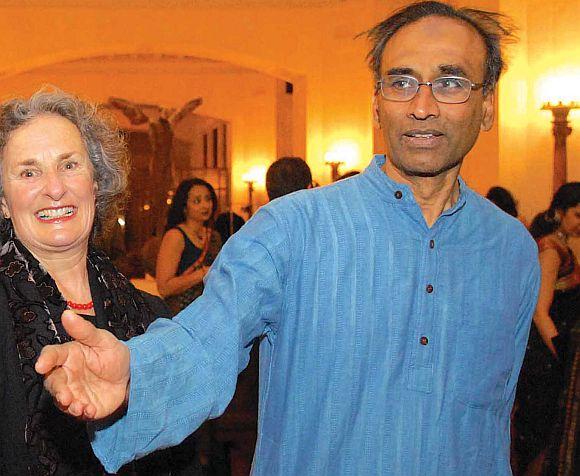
In the fourth part of the series on Dr Har Gobind Khorana, who passed into the ages on November 9, 2009 Chemistry Nobel winner Dr Venkatraman Ramakrishnan shares his memories of the great scientist.
Part I: Dr Khorana, Nobel laureate and one of science's immortals
Part II: Dr Khorana: 'Considerate, most remarkable man'
Part III: Dr Khorana: 'A loving father, a caring mentor'
While the Nobel Prize in Physiology or Medicine in 1968 was awarded jointly to Robert W Holley, Har Gobind Khorana and Marshall W Nirenberg for their interpretation of the genetic code and its function in protein synthesis, Dr Khorana's contributions were essential to complete the resolution of the issue of genetic code on which Nirenberg did some of the earliest work and determined most of the codes.
"The genetic code, which Dr Khorana helped establish, is a foundation of modern molecular biology, which would be unthinkable without it," explained Dr Venkatraman Ramakrishnan, who won the Nobel Prize in Chemistry in 2009.
"It is also the basis for a huge number of modern disciplines, including analysis of genomes and understanding of evolution. After he got the Nobel Prize for the code, Dr Khorana used his skills as a synthetic organic chemist to first completely synthesise a gene, insert it into a living organism and show it worked. At the time, this was an absolute tour de force. It is the basis for much of the synthetic biology today, and much of recombinant DNA technology relies on his groundbreaking work."
Dr Ramakrishnan noted that subsequently Dr Khorana worked on proteins that span the cell membrane, in particular membranes that are responsible for vision or that pump ions through membranes.
"This is a major area of research in biology today to which Dr Khorana made groundbreaking contributions" Dr Ramakrishnan, the India Abroad Person of the Year 2009, said from London.
He said the information in genes is used to make proteins and the genes in the form of DNA, store this information as a sequence of four building blocks of DNA called bases, A,T,C and G.
"The exact order and length of each gene is different and codes for a different protein. Proteins, however, are polymers of 20 types of building blocks called amino acids. The problem of how to go from the four-letter alphabet of DNA to the 20-letter alphabet of proteins was solved initially by Francis Crick, who showed it was a three-letter -- non-overlapping -- code. This then left the question of which amino acid each group of three bases specified. That is called the 'genetic code', and it was solved by Nirenberg and Khorana while he (Dr Khorana) was at the University of Wisconsin and their colleagues," he said.
"Dr Khorana's work on elucidating the genetic code is part of every undergraduate textbook on molecular biology. So, in that sense it has influenced us all."
He added that his own work is on how the ribosome helps read the code that Nirenberg, Khorana and others elucidated.
About 10 years ago, when Dr Ramakrishnan gave a talk at MIT hosted by Dr Uttam L Rajbhandary, a longstanding colleague of Dr Khorana, the 2009 Nobel Laureate was invited to a dinner after the programme.
Dr Ramakrishnan recalled Dr Khorana telling him at the dinner that "I'd been studying the three-dimensional version of what he and others had been working on in one dimension."
Obviously, it was a tribute for the third Nobel Laureate in science from India.
Dr Ramakrishnan, who knew Dr Khorana, had heard him give two talks before, one at a Gordon Conference around 1980 and one at Yale -- both when Ramakrishnan was a postdoctoral student.
"He was a very famous scientist in our field, and I certainly didn't know him at the time," he reminisced.
"So, that dinner was the first time I met him personally. I was a little nervous, but he was such a straightforward and unassuming man that I quickly fell at ease. He talked a lot about his Cambridge days as a postdoctoral student and we talked about how much Cambridge had changed. One thing that struck me is that he had a strong Punjabi accent, unlike many Indian Americans, which in my mind suggested that Dr Khorana was very comfortable with his roots, and who he was."